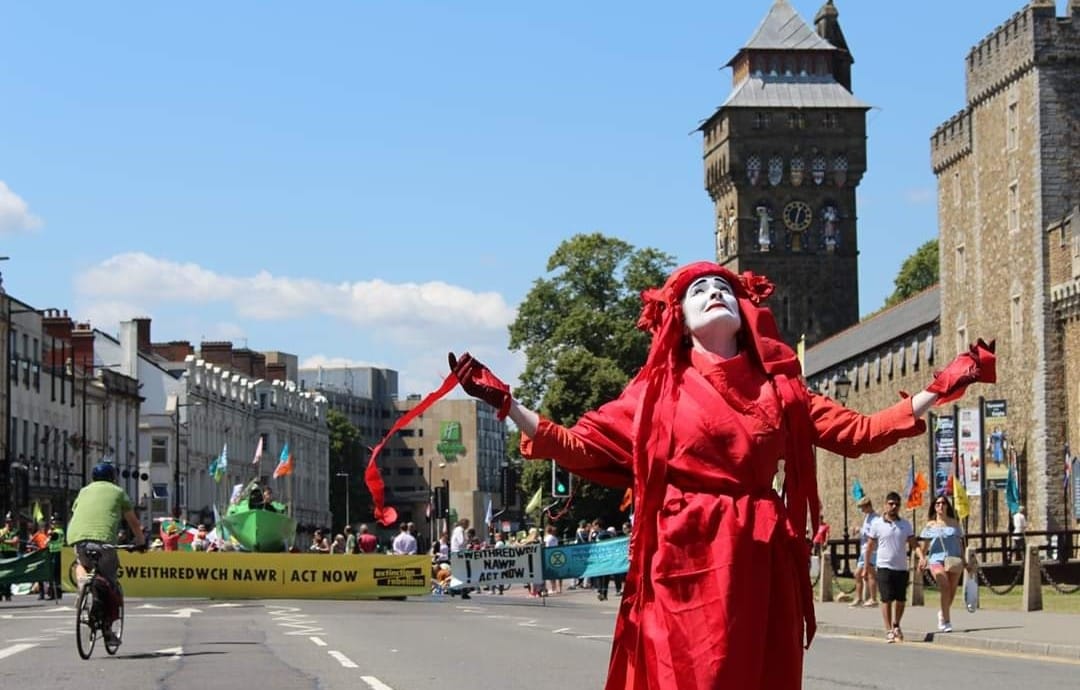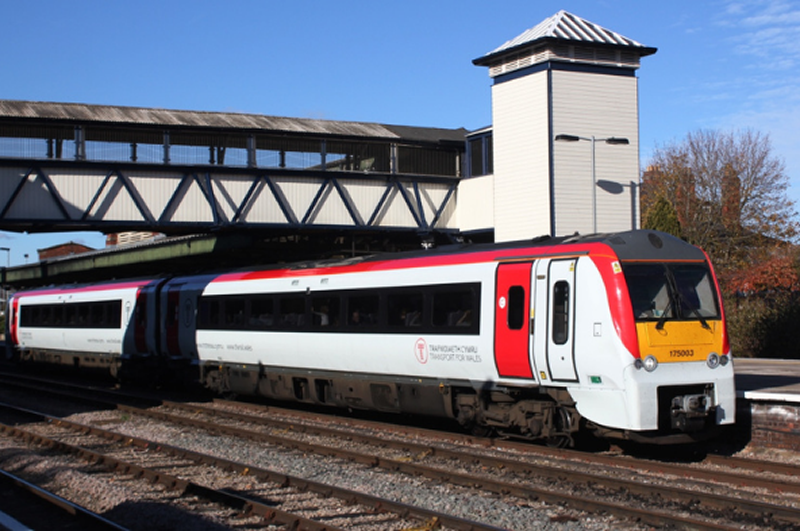
Climate Activists To Protest ‘Carmageddon’ In Cardiff – As Council Reopens Castle St To All Traffic
Photo: Extinction Rebellion block Castle St, Cardiff, to highlight the climate emergency, 2019. Image via Extinction Rebellion Facebook
A protest will take place on Castle St, Cardiff, at 5.00pm today (Thursday) against plans to re-open the city centre road to all traffic in the autumn. Environmental activists will march to City Hall, where councillors are set to confirm the changes, and hold an open air assembly.
Cardiff Friends of the Earth, Cardiff Greenpeace, Cardiff Cycle City, Cardiff Green New Deal and Cardiff Extinction Rebellion are just some of the groups behind the action.
Plans to reopen Castle St to all traffic generated a furious backlash from a range of people and groups, after it emerged that the council were planning to use £300,000 from Welsh Government’s clean air fund to remove a pavement and replace it with a traffic lane. Cardiff council has since said it will pay for the work itself.
But the reopening plans are still going ahead, despite the fact that the council’s own modelling shows that opening the street to all traffic will double levels of air pollution in the city centre from what they are now.
“Air pollution costs lives. Global warming costs lives,” a spokesperson from Cardiff Cycle City, said. “In Cardiff we need to play our part and achieve a modal shift from private cars to walking, scooting, cycling and public transport. Let’s maintain the progress that’s been made.”
The issue was also raised in The Senedd yesterday by Rhys ab Owen, Plaid Cymru member for South Wales Central.
He described the U-turn as “very disappointing, and a step backwards in terms of reducing air pollution levels in the city.”
Rhys ab Owen also called on Welsh Government to provide a written statement on their position on reopening Castle Street, and to clarify their stance on local authorities in general removing measures which reduce air pollution.
At the start of the pandemic, Castle St was closed to all traffic and housed a large marquee for people to sit and eat.
With Castle St and surrounding areas off bounds to traffic last summer, the city centre was connected to the Castle and Bute Park, with people able to move freely without encountering cars.
It also represented a rare and sudden expansion of public space in the centre, and meant that people could sit and eat on the castle lawn without being faced with large amounts of traffic and fumes.
Cycling from one side of the city to the other, without so many cars and vehicles to contend with, was made easier.
Many had hoped that the move would become permanent, even after lockdown restrictions lifted and roads became busier again.
In November 2020, the road opened up to public transport and taxis only, still a significant reduction on pre pandemic levels of traffic, which often caused so much air pollution that nitrous oxide levels regularly breached legal limits.
But earlier this month, following a consultation which received 6,227 responses, the council said a majority of 53.8% of respondents were in favour of reopening the road to all traffic, whilst 33.8% wanted it to remain closed to private cars.
There was a large age disparity in the results, with a clear majority of younger people in favour of keeping the road closed.
Environmental groups are calling on the council to pause the plans and hold a wider consultation, with the question of climate change and air pollution put front and centre.
“The closure of Castle Street is not the genie in the bottle solution to air pollution problems in Cardiff, but it must be taken as part of a series of bold clean air initiatives across the city which includes a clean air zone which seeks to reduce traffic flows and congestion in the city,” said Gareth Ludkin from Cardiff Friends of the Earth said:
Castle St in Cardiff has been the site of previous environmental protests. In July 2019, Extinction Rebellion, one of the groups backing today’s action, blockaded the road for 3 days in a row to force the government to address the climate emergency.
Last week, seven Extinction Rebellion groups in Wales took part in Make The Wave, part of a UK wide action involving over 90 coastal communities. Penmaenmawr, Borth. Aberystwyth, Cardigan, Poppit Sands, Aberavon, Mumbles and Cardiff were all involved in the initiative.
The events, held in the run up to the G7 summit in Cornwall to demand immediate action to tackle the ecological emergency, focussed specifically on the resulting rise in sea level from climate breakdown.
According to an October 2019 study by environmental consultants Afallen, unless urgent action is taken on the climate crisis, many parts of Cardiff could be underwater within 80 years. The town of Fairbourne in Gwynedd has already been ‘decommissioned’ due to rising sea levels.
*This article was updated to include the fact that Cardiff council have now said work to reopen Castle St would not be paid for from the clean air fund.


